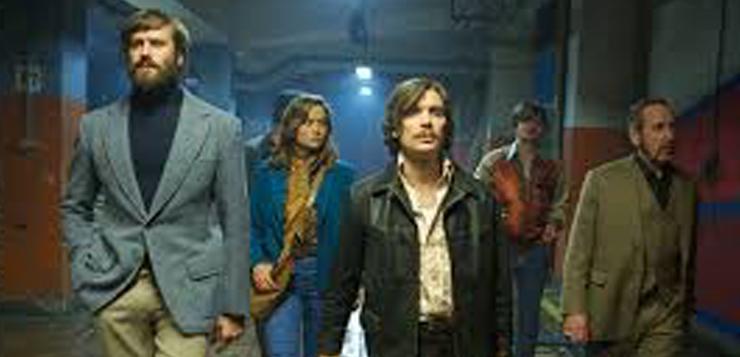The unexpectedly comical shoot-‘em-up ensemble from British director and writer Ben Wheatley (“Kill List” and “High Rise”) is “Free Fire,” an intricately staged action shootout taking place in a vacant Boston warehouse after a guns deal goes awry in the 1970’s.
Featuring an A-list cast, ranging from the 2016’s Best Actress Academy Award winner Brie Larson (“Room” and “Short Term 12”) who plays the lone female Justine, to the South African accented Sharlto Copley as Vernon, the eccentric cast handles an abundance of bullets, polyester suits, and witty one-liner remarks while two opposing gangs stand off for 90 minutes.
The battle ensues when black-eyed, druggie Stevo (Sam Riley) finds his perpetrator from the night before, the hot-headed Harry (following up his exquisite “Sing Street” performance) and guns go ablaze, literally, from there on out. Even Cillian Murphy and Armie Hammer exchange blows in this trigger-friendly rampage.
“Free Fire” is co-edited and co-written by Wheatley’s spouse Amy Jump (taking on those same roles in “Kill List” and “Sightseers”). The DePaulia sat down with director and writer Ben Wheatley on behalf of his film’s release on April 21.
“The thing about film is there are usually quite a few years between projects, so you’re a different person by that time. The writing, well, the writing is always different as well.
Other than a few technical changes, there’s no great structure that we have to it. It’s all done, really, on intuition,” Wheatley said.
Wheatley’s love for video games surely made its way into the production of “Free Fire.” The director cited the game “Counter Strike” as an inspiration and used the creative sandbox game “Minecraft” to help visually aid the pre-production stage.
“I think that influence (video games) has come from all sides. For me, I read a lot of comics and listen to a lot of music and play a lot of video games and I watch a lot of movies,” Wheatley said. “The influence of video games in movies is obvious; in “Free Fire” it’s there. The warehouse isn’t much different than the Assault level on ‘Counter Strike.’ The same upstairs office, the same sets of stairs, same pillars and things like that.”
Roughly the entire film takes place in the vacant Boston warehouse. Wheatley utilizes the space to maneuver his ensemble, enabling them to even drive a van that constantly features the work of John Denver on the radio.
The script came first, and then came the storyboards, followed by the creation of the anticipated set on “Minecraft.”
“We built the set again with cardboard boxes, and those were the same dimensions as ‘Minecraft’ cubes, so we were literally able to replicate the ‘Minecraft’ set,” Wheatley said. “The physical parts of the script always were changing. ‘Where’s the stairs, in relation to the door, in relation to the van?’ During ‘Minecraft,’ that door could have been anywhere and the stairs can be anywhere, so once we found our location, the stairs were a fixed thing that we could shoot around.”
Along for the ride was executive producer Martin Scorsese. Scorsese was a fan of “Kill List” and Wheatley begged his agents to set him up with the “Cinema God,” as Wheatley puts it.
“He helped finance the film and cast the film and he helped take the project more seriously. Having him on board as a resource, just a master in filmmaking, you go to him and ask him, well you don’t want to ask him too much and get under his feet because he’s so busy,” Wheatley said. But we had a long conversation after we edited a final version just to make sure we did it all right.”
Last year, “Free Fire” premiered at the Toronto International Film Festival (TIFF) and in March screened at South by Southwest (SXSW). In a Q&A, Wheatley mentioned that 7,000 bullets were shot in the film. One location, 7,000 bullets.
Wheatley, a British director, implies his struggles while trying to market a lower budgeted film overseas.
“When you don’t have the marketing budget of a big studio picture, it’s super important to get as much publicity wherever and whenever you can get it. So festival reviews and festival word of mouth is important,” Wheatley said. “There’s usually quite a heavy festival run, some of my films have run for 40 or 50 festivals. America is so f*****g big, to penetrate the media to get to the right amount of people to get them to the cinema is huge.”
“It’s really difficult. From my perspective as a Brit, you see it with bands, how they are massive in the UK and then nothing in the states. A 10-day tour isn’t enough, you need to keep going back and back again and that’s why I’m on movie number six,” Wheatley said.


